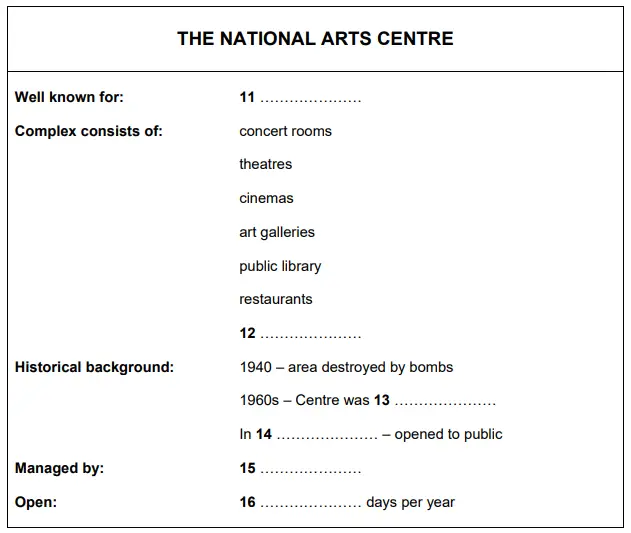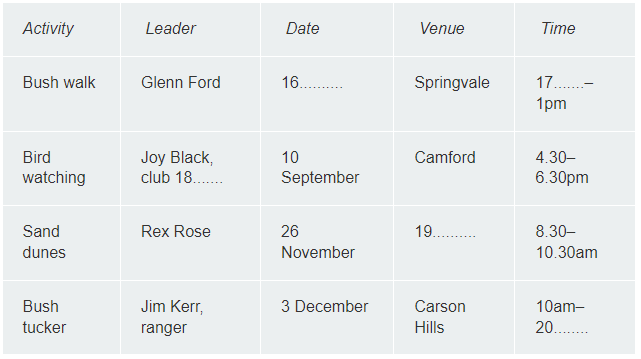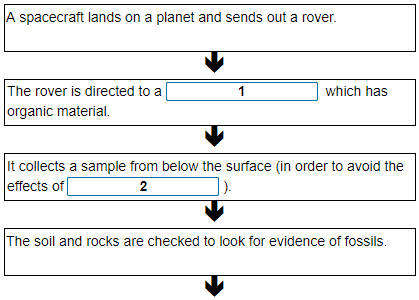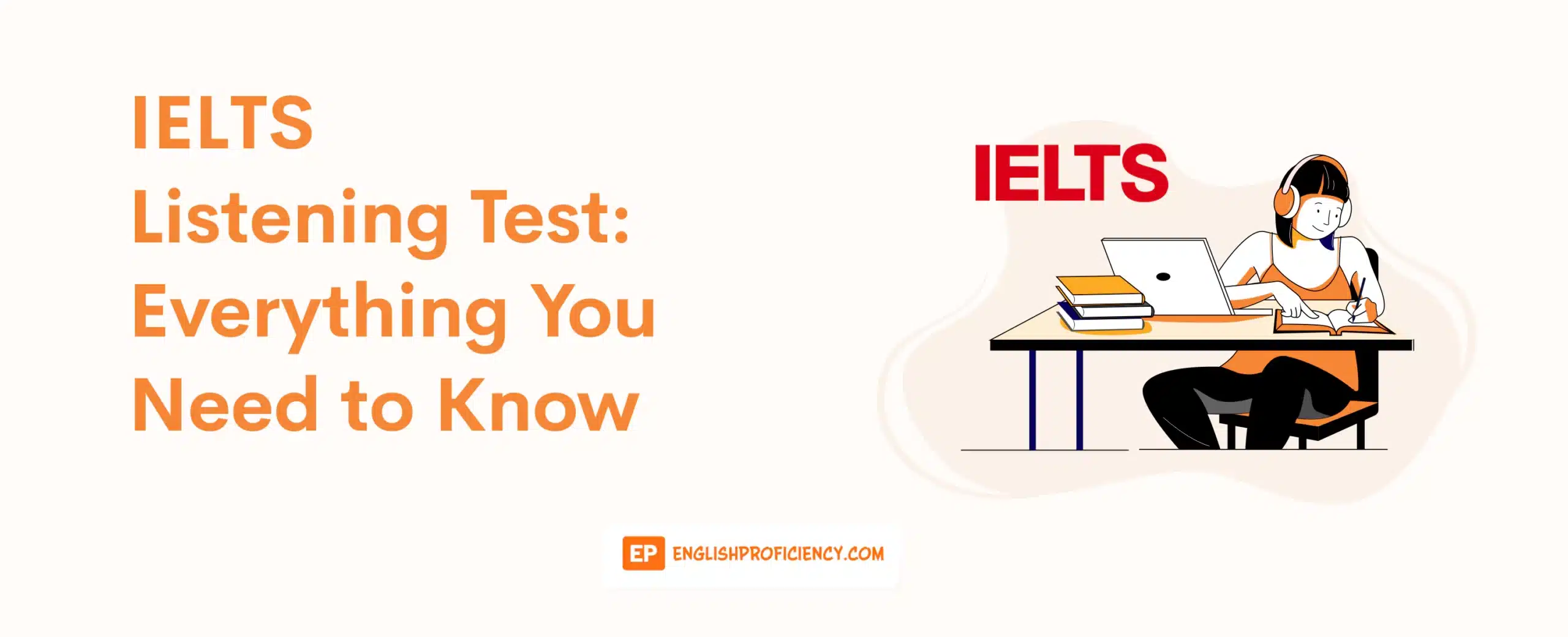The International English Language Testing System (IELTS) is a set of tests designed to assist you if you plan to work, study, or move to a country where English is the primary language. This includes Australia, Canada, New Zealand, the United Kingdom, and the United States. It has four sections: Speaking, Reading, Listening, and Writing.
International experts design the content of the IELTS test. It goes through extensive research to make it a point that the test is fair and unbiased for all candidates regardless of their nationality, background, gender, lifestyle, or location.
The IELTS Listening Test is one of the four tests in the IELTS exam. While some candidates claim this is not that challenging, a vast majority of those who have taken it would say it is one of the most difficult, if not the most difficult of all sections. Unlike the IELTS Speaking, Reading, and Writing Tests that allow you to review and correct your responses, the IELTS Listening Test does not give you that option because the audio recordings will be played only once.
This article will help you ace the IELTS Listening Test by providing you with the information there is to know about this part of the test. From the test format to the tips and tricks on how to get a high band score, you will find it here.
- What is the IELTS Listening Test?
- What are the Types Of IELTS Listening Questions?
- How to Improve Your Listening During the IELTS Test?
- How to Ace the IELTS Listening Test?
- How to Improve Your Overall English Listening Skills?
- How to Prepare for the IELTS Listening Test Section?
- Additional FAQs on IELTS Listening Test
What is the IELTS Listening Test?
The IELTS Listening Test is the same for the Academic and General Training modules. It takes 30 minutes to finish and is divided into four parts. There are ten questions to answer in each part. You have to listen to audio recordings that will be played only once to answer the questions.
If you are taking the IELTS Listening Paper-based test, you must listen and write your answers on the question paper simultaneously. You will then be given extra 10 minutes to transfer your paper to your answer sheet.
Moreover, if you plan to take the IELTS Listening computer-delivered test, you encode your answers directly into the computer. You are not given extra 10 minutes to transfer your answers because your answers are inputted directly into the computer. Instead, you are given 2 minutes to double-check your answers and change anything should you wish to.
Your score in the IELTS Listening Test is calculated in terms of the total number of accurate answers you get out of the 40 questions. Your marks are not deducted for incorrect answers.
To get a clear idea of how the IELTS Listening Band is calculated, please click here: IELTS Band Scoring System.
The IELTS Listening Test is divided into four parts, and the level of difficulty of each question increases from one part to the next.
Part 1 or Section 1
The first part of the IELTS Listening Test is a 2 to 3 minute conversation between two people in a social context. It is ‘transactional,’ which means that one of the participants in the discussion wants something. It could be that they wish to join a club, inquire about a product or service, or it could be anything related to their university studies.
Part 2 or Section 2
Part 3 or Section 3
The third part of the IELTS Listening Test is a conversation between two to four people in an educational and training context. You will hear a 3-4-minute ‘campus discussion’ recording in which people talk about their university classes. Sometimes the group is made up entirely of students who are discussing a significant project or task. Other times, you might hear students on the recording asking a lecturer or instructor for help.
Part 4 or Section 4
The last and fourth part of the IELTS Listening test is a speech or talk with just one person on an academic subject. It is a brief academic lecture of about five minutes. It is the most challenging part of the test, and there is no break in the middle, unlike the other parts. Although, about halfway through the recording, the speaker takes a slight pause
In the IELTS Listening Test Parts 1 to 4, you will be assessed in terms of your ability to:
- spell words correctly
- use appropriate punctuation marks
- understand the conventions on how to write English correctly. For example, we write ‘4th/fourth floor’, not ‘4/four floor.’
What are the Types Of IELTS Listening Questions?
While preparing for the IELTS ListeningTest, it is recommended that you get yourself familiar with the different question types that will appear in the test. This way, you will be more confident and concentrate fully on the audio recordings while not missing the important details.
Here are the different question types that will appear in the IELTS Listening Test.
Multiple Choice Questions
You will be presented with a ‘stem.’ The stem can either be in the form of an incomplete sentence or a question. There are two types of multiple-choice questions, one is with only one answer (example 1), and the other one has two or more answers (example 2).
Example 1:
Select the correct letter, A, B, C, or D.
- Which of the following factors affected how much each consortium member would contribute to the construction costs?
A. How much land each company-owned
B. How long has each business possessed oil-field land
C. How many employees does each company have
D. How many oil wells on the company’s property were
Example 2:
Which THREE items are you allowed to bring to the spa?
- towel
- ticket
- watch
- money
- slippers
- make up
- ___________
- ___________
- ___________
Short Answer Questions
You will be presented with questions that you need to answer. This type of question, like the sentence completion task, usually requires answers in no more than three words, but double-check the instructions to be sure.
Example 1:
Answer the questions below.
Your answer for each should be no more than three words/numbers.
- Where are the tourists going?
- What time is the tour going to end?
- How will the group go back to the hotel?
Example 2:
Answer the questions below.
Your answer for each should be no more than three words/numbers.
- Who arrived late for the tour?
_____________
_____________
- Name two things that tourists can bring inside the viewing deck.
_____________
_____________
Sentence Completion
You will be presented with incomplete statements, and you need to complete them using the information from the audio recording. Usually, you have to complete the statements in not more than three words but to be sure, double-check this with the given instructions.
Example:
Complete the sentences below.
Your answer for each should be no more than three words.
- The express train leaves at ___________.
- The tourists are advised to ___________ before leaving.
- The ___________ is the city’s central park.
Note, Summary, Form, or Table Completion
You will be presented with either an incomplete note, summary, form, or table based on the audio recording or parts. You need to complete them using the information from the audio recording.
Example 1:
Complete the note below.
Your answer for each should be no more than three words/numbers.

Example 2:
Complete the table below.
Your answer for each should be no more than three words/numbers.

Labelling a Map, Plan, Flowchart, or a Diagram
You will be presented with a map, plan, or diagram, and you need to label them. You might be given options, or you will have to choose the answers from the audio recording itself.
Example 1:
Complete the flowchart below.
Your answer for each should be no more than three words/numbers.

Example 2:
Complete the diagram below.
Your answer for each should be no more than three words/numbers.

Matching
You will be presented with a list of details from the audio recording, and you need to match them to a given set of options.
Example:
Which counselor should you see?
Select the correct answer A, B, C, or D.
- Martha Lee
- Luke Smith
- Amanda Wills
- Rebecca Jones
- If your concern is about academics
- If you plan to discuss an urgent matter
- If you are only available on weekends
Classification
You will be given a list of information. You need to classify them according to the given options.
Example:
How should the tourists enter the following attractions?
Write the correct answer A, B, or C.
- individually
- in pairs
- in groups
- the library ___________
- the museum ___________
- the art exhibit ___________
How to Improve Your Listening During the IELTS Test?
Some candidates who have taken the IELTS Listening Test say that this part of the test is more challenging than it seems. Though the topics covered aren’t that complex and focus mainly on day-to-day activities, the pressure to listen to the audio recordings just once is too tough to handle.
We strongly recommend that you employ all techniques and strategies to ace this part of the test. Here are some helpful and proven tips to help you get the band score you are aiming for in the IELTS Listening Test.
- Learn how to do signposting: The process of using phrases and words to direct the reader through the gist of a text or a recording. In the case of the IELTS Listening Test, it is an audio recording. With these words and phrases, you can expect what is next and eventually figure out the answer.
Example:
Purpose
Introduction to the lecture
Sign Posting Language
The subject of my lecture is…
This lecture will focus on…
Purpose
Structure of the lesson/lecture
Sign Posting Language
This lecture is divided into _____ parts…
First, we will have…Then we will go to…
Purpose
Introduction of the first part
Sign Posting Language
To start with…
Let’s start by…
Purpose
Start of an idea
Sign Posting Language
Now let’s have…
This time I’d like to talk about…
Purpose
Summing up
Sign Posting Language
To summarize…
From what I have discussed, it is evident that…
- Practice pronouncing letters and numbers: A speaker frequently spells out words in the test, and numbers are read out, so make sure you understand how different letters sound in various accents, not just words. The different accents employed in the IELTS Listening Test are Australian, Canadian, British, New Zealand, and American.
- Enhance your ‘listening’ skills: This is one of the most crucial IELTS Listening strategies. Practice with IELTS listening tests, but you should also get as much English exposure as possible. It should be aimed at your present level. Bear in mind, however, that it is pointless to listen to BBC World if you do not comprehend anything. Find online materials that are appropriate for your skill level and gradually increase the difficulty. Do not worry if they are not tests or intended for IELTS; any type of listening is beneficial. As you obtain experience, you can progress to increasingly challenging tasks.
- Practice writing while listening at the same time: Listening and writing skills are not difficult, but if you do them simultaneously, there is a chance that one of the two will be compromised. That is why you should put this into practice before taking the IELTS Listening Test. Practice tests are one way to do this, but you may also try listening to audio while taking notes simultaneously. This will help you enhance your ability to do both tasks simultaneously.
How to Ace the IELTS Listening Test?
The IELTS Listening Test takes only 30 minutes, and it could be the shortest half an hour experience of your life. Make it a point that you manage your time well, as this can mean the difference between a high and low band score.
Below are proven and practical tips and tricks on how to ace the IELTS Listening Test with ease.
- Watch out for paraphrased sentences: Remember that what you hear will almost certainly differ from what is printed on the test paper because that would be too simple. Synonyms are used in the question and the stems, so you must pay attention to these.
- Ignore unfamiliar words: In the IELTS Listening Test, chances are you will hear words that you do not know. Do not panic if this happens. These words may be and if there are questions about these words, make an educated guess.
- Highlight important ideas: To help you ‘hear’ the answer, underline significant words in the question stems when you first look through the questions. These words may be names, locations, and dates. Keep in mind, however, that synonyms are commonly used, as previously stated.
- Be mindful of spelling and grammar: Remember that if your answer is misspelled or the grammar is not correct, it will be marked wrong. Double-check these when you transfer your answers on the answer sheet. The sentences on the test paper might assist you with grammar – does it make grammatical sense? Is it a verb, a noun, or an adjective?
- Take a look at two questions at the same time: Some questions may contain answers close together in one line, so if you only look at one question at a time, you may miss one. Another reason why you should do this is you can miss an answer if you are only looking at one question.
- Be careful of writing your answers right away: During the IELTS Listening Test, speakers will frequently provide an answer and then correct themselves after. As a result, the first response that appears correct may be incorrect. Be careful, as a lot of candidates have fallen into this ‘trap.’
- Be cautious when transferring your answers to the answer sheet: It will be marked wrong if you put correct answers in the wrong portion on the answer sheet. Therefore, make sure you put the answer in the right place. This is easy to do if you do not leave a question unanswered, so do not leave a question blank.
How to Improve Your Overall English Listening Skills?
The IELTS Listening Test is arguably the most difficult among the four sections of IELTS. There is no room for errors in this part of the test, and once you miss a piece of information, it is gone.
Here are the best and most effective ways to improve your listening skills for the IELTS Listening Test.
- Love English and use it as often as you can: Why are professional dancers so skilled at their craft? It is because they enjoy what they do and do it daily. If you enjoy English, you will try to expose yourself to English regularly, such as songs, movies, and even people. Allow your brain and, presumably, your ears to become accustomed to listening to English.
- Practice by doing something enjoyable: Listening in enjoyable situations will make you feel less pressured and compelled to do it. This is when the ‘fun’ aspect of learning comes in: movies and music. Choose your favorite film. Then watch it again, this time paying attention to the dialogues. You will have a couple of conversations stuck in your brain without even realizing it.
- Listen to podcasts and audiobooks: Podcasts are the most effective approach to enhance your listening skills, and multiple research studies support this. Another method that you can apply is listening to audiobooks. Unlike movies and television shows, you do not see how people open their mouths when they say a word, and thus, your only option is to listen attentively.
- Listen to or attend lectures: Remember that the last part of the IELTS Listening Test is a lecture, so get used to listening to and taking notes during lectures. Lectures frequently follow particular patterns, such as an introduction that informs you of the topic and essential points, as well as signposts. There are many lectures you can find online, and they also offer transcriptions so you can double-check your answers.
Additional Reading — Improve Your Overall English Skills
How to Prepare for the IELTS Listening Test Section?
Taking the IELTS Listening Test can cause you stress and anxiety, especially if you are not prepared and do not know what to expect on the test. To help you perform at your best, here are a few pieces of advice we can give you.
Before the Test
- Get enough rest and sleep well before the test: Make sure that you are well-rested and energized on the day of the test. This will help you keep your focus and attention on nothing but the test.
- Prepare everything you need: Have your ID ready, the same ID that you use upon registration. You may also prepare a (clear) water bottle in case you need to quench your thirst while taking the IELTS Listening Test.
- Know the location: Make it a point that you know where the testing facility is before you take the test. Have a sense of the traffic movement in the neighborhood. Be ON TIME.
During the Test
- Read the instructions carefully: The instructions tell you how many words to write. If it asks for no more than two words and you write three, it will be wrong. And you must only put in the words asked for. For example, it will be wrong if there is a question like “at …… am” and you write “at 8 am” on the answer sheet. You should only write what is missing, in this case, “8”.
- Predict what the topic would be: It is better to listen if you know the type of conversation that is taking place. You can visualize it in your mind. So, in the time allotted, go over each portion and ensure you recognize who is speaking to whom and what the topic is.
- Anticipate what questions will be asked: You should also try to get a sense of the type of information you are listening to. For example, in the first part, you must frequently listen for names, numbers, and addresses. In the time you have been given, look over the questions and figure out what needs to go where.
- Find time to browse each section: At the end of each part, you have 30 seconds to double-check your answers. After that, you are instructed to turn over and spend 30 seconds looking at the following part. Although some IELTS Listening tips advise you to double-check what you have written, you will not be able to do so because the audio recordings are only played once. Instead, skip ahead to the next section and read the next part. It is an effective way to utilize your time better.
- Be careful with the order of questions: More often than not, you will be given a table, diagram, or flowchart to complete. The questions may not be from left to right all the time, so double-check the order, or you will be lost and confused.
- In case you are lost, watch others:
If you lose track of where you are, watch when the other candidates turn the page of their test papers. This will help you have an idea of which part the audio recording is currently at.
- Answer ALL questions: Keep in mind that the IELTS Listening Test does not penalize you for incorrect answers. In case you have no idea what the answer might be, take a wild guess, and if luck is on your side, you might just get it right.
After the Test
- Relax and unwind: After weeks and maybe months of hard work and preparation, this is now your time to relax and give yourself a treat. Whatever it is that relaxes you that you haven’t been able to do in the last few weeks, do it. You deserve it.
- Accept the result positively: The IELTS test can sometimes be about luck; whatever the result will be, accept it positively. You may have to retake it, and it’s okay. It is just what it is. If you get your desired band score, give yourself a treat and plan for what’s ahead.
-
For a thorough and comprehensive guide on how to prepare for the entire IELTS test, check out our comprehensive IELTS preparation guide.
Additional FAQs on IELTS Listening Test
How Many Parts and Questions are there in the IELTS Listening Test?
There are four parts in the IELTS Listening Test, and there are 40 questions to answer in total. The difficulty level of the questions progresses as you proceed from one part to the other.
The first and second parts of the IELTS Listening Test focus on a conversation and a speech about a situation in a social context.
On the other hand, the third and fourth parts cover a conversation and a speech about an educational and academic situation.
How Many Times Will I be able to Listen to the Recording?
The audio recordings will be played only once. Hence, if you miss the answer to a specific question, you should immediately proceed to the next question, or you will be lost.
You are also strongly advised not to leave any question blank because doing so might cause you confused as to where to write the succeeding answers.
How Long Do I Get to Transfer the Answers to the Answer Sheet?
If you take the IELTS Listening Paper-based test, you will be given 10 minutes to transfer your paper on your answer sheet.
Ensure that you transfer your answers carefully. Double-check spelling and punctuations. They may seem minor details, but they contribute to your overall mark.
Which Accents Will I Hear in the IELTS Listening Test?
You will hear any standard variation of English, including British English, American English, and Australian English because universities in all major English-speaking countries approve IELTS.
Within each variety, there may be different regional forms. Scots, Northern Irish, Welsh, Scouse, Yorkshire are just a few of the accents found in the United Kingdom.
Familiarizing yourself with these accents is advantageous.
Should I use British or American Spelling in the IELTS Listening Test?
Just as there will be a variety of accents in the IELTS Listening Test, you are also allowed to use either spelling, British or American.
For example, ‘favor’ and ‘favour’ are both correct. However, as a general rule, you have to decide which spelling you want to use and stick with it. This also applies to the IELTS Reading and Writing Tests.
Additional Resources for the IELTS Listening Section
There are a lot of IELTS Listening materials these days that will help you with every preparation you need before taking the test. Take advantage of those. However, make sure that you utilize only those that are from reliable sources.
Improving your English While Listening
IELTS Listening Practice Tests

